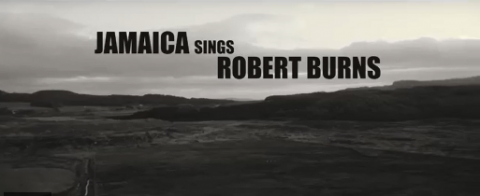Day 19, Year of #Mygration: Jamaica sings Robert Burns

All over the world this evening, 25 January, there are Burns’ Night suppers celebrating the poetry of the eighteenth century Robert Burns who never left Scotland. He bought a ticket to Jamaica in 1786 but didn’t use it. On our theme this month of being ‘Open to People’, Jamaica sings Robert Burns is a remarkable project in which contemporary Jamaican artists respond to an almost-migrant from over two centuries ago.
A BBC documentary, ‘Jamaica Sings Burns’, explores what Robert Burns' poetry and song would have sounded like if he had stepped on that boat to Jamaica in 1786.
Nor is this the only example of art forms exploring what might have happened if Robert Burns had emigrated to Jamaica. See, for example, an imaginary journal written by Andrew Lindsay.
Burns’ own imagination of the romance of migration is indicated by the opening to his poem on the prospect of going to Jamaica with Mary Campbell:
Will ye go to the Indies, my Mary,
And leave auld Scotia's shore?
Will ye go to the Indies, my Mary,
Across th' Atlantic roar?O sweet grows the lime and the orange,
And the apple on the pine;
But a’ the charms o' the Indies
Can never equal thine.
Mary Campbell died before they could set sail and Burns’ financial difficulties were alleviated by the successful publication of poems. So he did not take up his intended job as a book-keeper on a sugar plantation in Jamaica, which would have embroiled him in the forced migration of slavery, but stayed in Scotland.
The Scottish diaspora continues to relate to his legacy, especially on 25 January. This time last year, for example, the continuing relevance of Burns to our era of Brexit and President Trump was explored via OpenLearn.
Contact our news team
For all out of hours enquiries, please telephone +44 (0)7901 515891
Contact detailsNews & articles

Grant recipients announced for the 2025 Open Business Creators Fund for Women in Business
The businesses selected to receive funding from the Open Business Creators Fund for Women in Business, (delivered by The Open University and sponsored by NatWest) have been announced.